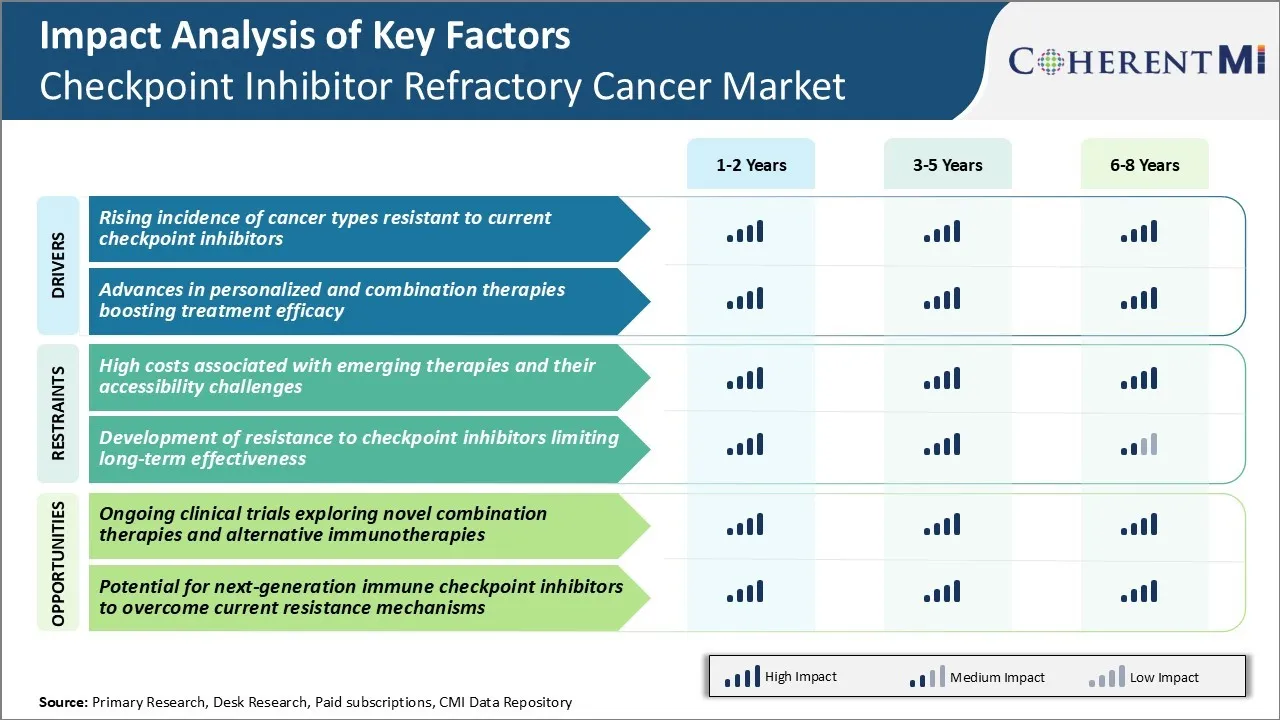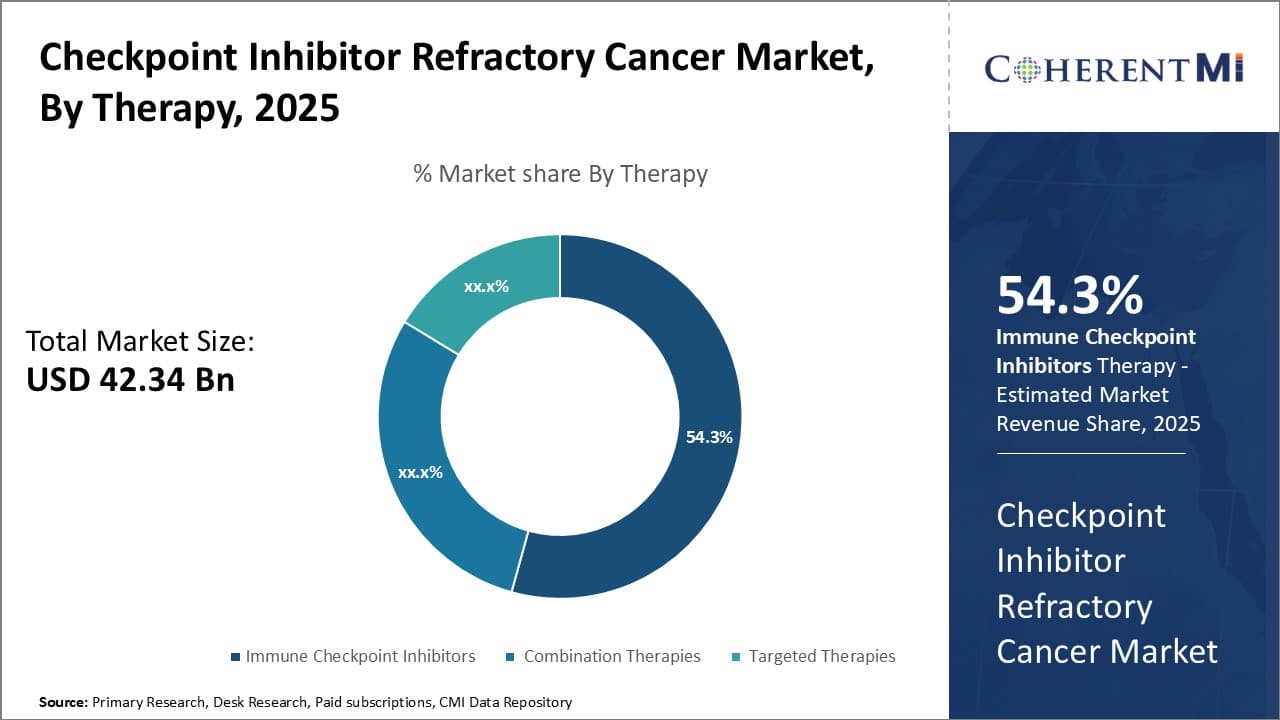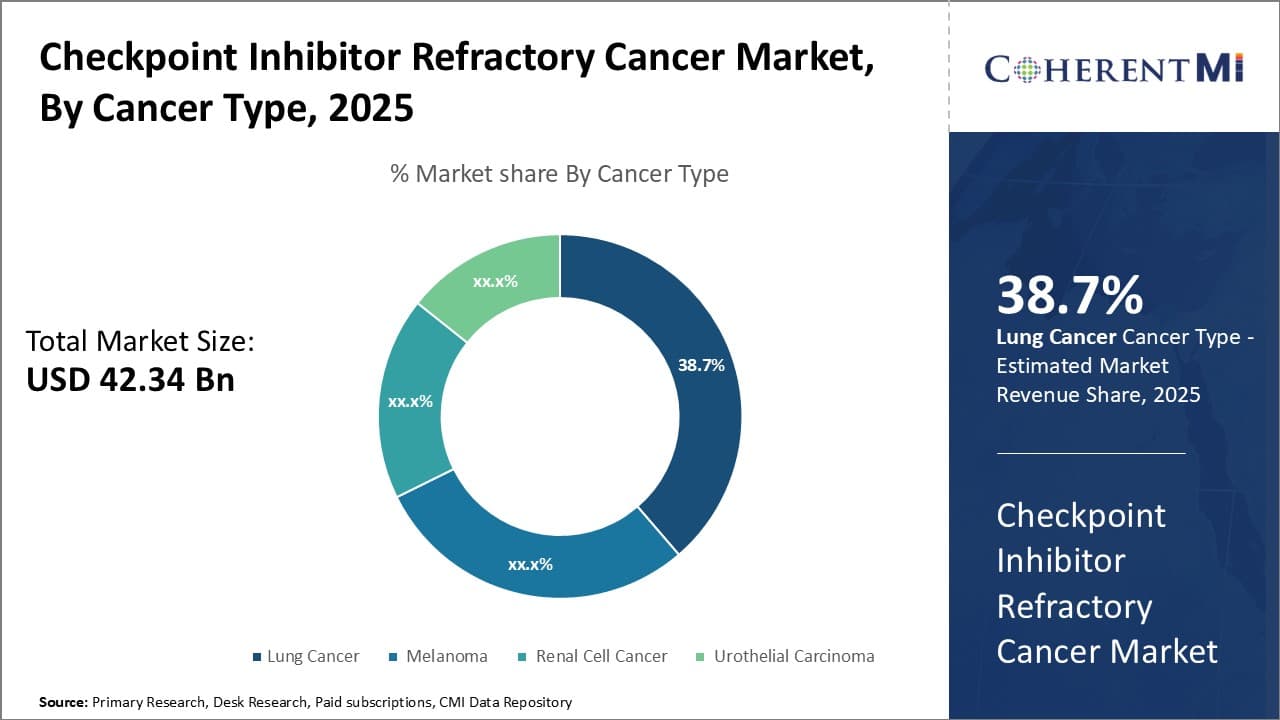

The checkpoint inhibitor refractory cancer market is estimated to be valued at USD 42.34 Bn in 2025 and is expected to reach USD 95.37 Bn by 2032, growing at a compound annual growth rate (CAGR) of 12.3% from 2025 to 2032. This market comprises revenue generated from drugs being administered to treat cancer that has become non-responsive or resistant to checkpoint inhibitor therapies such as anti-PD-1 and anti-CTLA-4 drugs.
Market Size in USD Bn
CAGR12.3%
| Study Period | 2025-2032 |
| Base Year of Estimation | 2024 |
| CAGR | 12.3% |
| Market Concentration | High |
| Major Players | Bristol-Myers Squibb, Merck, AstraZeneca, F. Hoffmann-La Roche (Genentech), Regeneron Pharmaceuticals and Among Others |
Market Driver - Rising Incidence of Cancer Types Resistant to Current Checkpoint Inhibitors
With significant advances being made in the area of cancer immunotherapy, checkpoint inhibitors have emerged as an important treatment option for various types of cancer. Checkpoint inhibitors work by blocking certain proteins made by some types of immune system cells, known as 'checkpoints', that can keep the immune system from attacking cancer cells.
It has been observed that some cancers are inherently resistant to immune checkpoint blockade. For example, pancreatic cancer which has been known to develop an immunosuppressive tumor microenvironment that helps it evade immune attack. Similarly, prostate cancer is also recognized to be less immunogenic compared to other cancers and does not respond well to checkpoint inhibitors.
With rising incidents of various cancer types globally, the number of patients diagnosed with cancers resistant to checkpoint inhibitors is steadily increasing. As per medical experts, around 40-50% of cancer patients develop resistance to initial checkpoint therapy. This highlights the clear unmet need to develop novel therapies effective for cancers not responding to current immunotherapy options. The large patient pool unable to benefit from standard checkpoint inhibitors is driving significant focus on research and development of new drugs targeting treatment resistance.
Market Driver - Advances in Personalized and Combination Therapies Boosting Treatment Efficacy
Immunotherapy has transformed cancer treatment in recent years. However, more research was needed to improve response rates and durations of responses with checkpoint inhibitor monotherapies. This has fueled significant research efforts to develop rational combination strategies that leverage synergies between different treatment modalities.
One approach gaining momentum is using biomarkers to identify patients most likely to benefit from certain combinations. For example, tumors with high microsatellite instability have been shown to respond very well to checkpoint inhibitors. Similarly, PD-L1 testing helps identify patients with PD-L1 positive tumors that may respond favorably to PD-1/PD-L1 targeted therapies.
Another active area of research involves combining checkpoint inhibitors with other immunotherapy drugs or conventional cancer treatments. For instance, combining CTLA-4 blockade with PD-1/PD-L1 inhibitors aims to target two immune checkpoints synergistically. Similarly, using checkpoint inhibitors with radiation, chemotherapy or targeted therapies holds promise. Enhancing immunogenic cell death through such combinations may help trigger anti-tumor responses.
Early clinical evidence suggests these personalized, rational combination strategies are helping overcome resistance and improve outcomes for more patients compared to single agent therapies alone. Continued advances in this area are expected to transform treatment paradigms and boost efficacy for cancers unresponsive to existing checkpoint inhibitor options.
 To learn more about this report, Download Free Sample Copy
To learn more about this report, Download Free Sample Copy
Market Challenge - High Costs Associated with Emerging Therapies and Their Accessibility Challenges
While checkpoint inhibitor therapies have shown promising results in certain cancer settings, several critical challenges remain in delivering these emerging treatment options to all patients in need. One major hurdle is the exorbitantly high cost of many immunotherapies currently available or in late-stage development.
For instance, leading PD-1 and PD-L1 inhibitors frequently carry price tags of over $100,000 annually, putting them out of reach for many healthcare systems and patients even in developed countries. Even for indications where immunotherapy has become the standard of care, accessibility remains limited due to budget restrictions.
Furthermore, most payers rarely approve alternative immunotherapies once patients have progressed on first-line treatment due to comparative lack of evidence, high costs and affordability constraints. This leaves a significant portion of refractory cancer patients with no good treatment options. Additional research is urgently required to develop lower cost combination or sequential regimens that can achieve comparable or better efficacy outcomes at affordable prices.
Market Opportunity - Ongoing Clinical Trials Exploring Novel Combination Therapies and Alternative Immunotherapies
There is promising momentum in exploring new therapeutic approaches to address the unmet needs of checkpoint inhibitor refractory cancer patients. Multiple ongoing clinical trials are evaluating innovative combination strategies involving immunotherapy agents, targeted drugs and conventional chemotherapy with the goal of enhancing response rates.
Combining agents with complementary immune modulating mechanisms, like CTLA-4 and PD-1/PD-L1 inhibitors, holds potential for synergistic anti-tumor effects. Alternative approaches being assessed include immunotherapies targeting new checkpoints like LAG-3, TIGIT, TIM-3 and IDO1. Several trials are also repurposing existing immunotherapies in refractory settings to leverage known safety profiles.
Early data from some studies indicate scope for improved outcomes through rational multi-pronged treatment regimens. Further positive results from late-phase trials over the next few years could potentially introduce much-needed new standards of care offering checkpoint inhibitor refractory patients better survival rates.
For first-line treatment of refractory metastatic cancers, prescribers commonly prescribe a combination of Opdivo (nivolumab) or Keytruda (pembrolizumab), checkpoint inhibitors, along with chemotherapy drugs like Alimta (pemetrexed) or carboplatin. This approach aims to synergistically boost the immune response along with reducing tumor size.
However, upon disease progression, treatment typically moves to second-line options. At this stage, for cancers like non-small cell lung cancer, physicians may choose newer targeted therapies like Tagrisso (osimertinib) for EGFR+ tumors or Alecensa (alectinib) for ALK+ cancers. Meanwhile, for most refractory advanced cancers, prescribers rely on chemotherapies like Abraxane (nab-paclitaxel), Gemzar (gemcitabine), or Taxol (paclitaxel). Some oncologists also prescribe off-label use of Tecentriq (atezolizumab) or Bavencio (avelumab) as single agents.
For third-line therapy and beyond, treatment selections are largely based on individual case factors like specific mutations, organ dysfunction, co-morbidities, and performance status. Defactinib in combination with chemotherapy may be explored for KRAS-mutated cancers. Alternatively, prescribers may offer clinical trial enrollment if a suitable option is available. Palliative care is prioritized to maximize quality of life once standard options are exhausted.
This report provides a brief yet detailed overview of checkpoint inhibitor refractory cancer treatment pathways while also touching upon factors influencing prescriber decisions at different disease stages.
Checkpoint inhibitor refractory cancer is a difficult stage of disease where initial immunotherapy has failed. There are few remaining options that offer the potential for response. The line of treatment and tumor characteristics help determine the best approach.
For patients who progress after first-line immunotherapy, subsequent systemic therapies are considered second-line treatment. Clinical trials exploring combination chemotherapy plus targeted agents or other immunotherapies are often recommended. The KEYNOTE-191 trial showed pembrolizumab plus chemotherapy improved outcomes for selected patients over chemotherapy alone. For those with microsatellite-stable disease, regorafenib or trifluridine/tipiracil are oral targeted options.
When both immunotherapy and chemotherapy options are exhausted, the disease is considered late-stage refractory cancer. Clinical trials of novel agents remain important here, but aggressive local therapies may provide benefit with minimal side effects if limited metastases are present. Stereotactic radiosurgery has shown promise for controlling selected brain metastases. Ablative techniques like radiofrequency ablation can sometimes control liver or lung tumors.
While the options are limited in refractory stages, an individualized discussion of potential benefits, side effects, and goals of care is crucial. Considering both clinical and molecular tumor profiles alongside the patient's values helps healthcare providers recommend the most appropriate approach in each case to maximize quality of life wherever possible.
Focus on combination therapies: Most major players have focused on developing combination therapies that pair checkpoint inhibitors with other treatment modalities like chemotherapy, targeted therapy etc. For example, Merck & Co. developed Keytruda (pembrolizumab) in combination with chemotherapy for gastric cancer. In a Phase 3 KEYNOTE-062 trial, the combo doubled median overall survival compared to chemotherapy alone.
Acquisitions of complementary technologies: Companies have made strategic acquisitions to enhance their refractory cancer portfolios. For example, in 2019, Bristol-Myers Squibb acquired Celgene Corp for $74 billion, gaining access to its large oncology pipeline including drugs like Revlimid for multiple myeloma. Revlimid has continued driving billions in annual sales.
Partnering with Bio-techs: Bio-techs have novel targets and mechanisms that large pharma can commercialize. AstraZeneca has partnered with other firms, yielding successful drugs. For example, in 2017, it partnered with Daiichi Sankyo on ENHERTU. In a Phase 3 trial, ENHERTU doubled progression-free survival vs. trastuzumab emtansine in HER2-positive metastatic breast cancer.
Strategic early-stage investments: Companies invest in developing expertise in core research areas like immunotherapy. For instance, Roche has made major R&D investments in oncology including a $1.9 billion acquisition of Ignyta in 2018 and $1.7 billion purchase of Foundation Medicine in 2018.
 To learn more about this report, Download Free Sample Copy
Insights, By Therapy: Immune Checkpoint Inhibitors Lead Due to Effectiveness Against Various Cancers
To learn more about this report, Download Free Sample Copy
Insights, By Therapy: Immune Checkpoint Inhibitors Lead Due to Effectiveness Against Various Cancers
In terms of therapy, immune checkpoint inhibitors is likely to hold 54.3% revenue share of the checkpoint inhibitor refractory cancer market owning to its effectiveness against various refractory cancer types. Immune checkpoint inhibitors work by blocking proteins made by some types of immune system cells, called T-cells, that act like brakes on the immune system and stop it from attacking the cancer cells.
By blocking these proteins, called PD-1 and PD-L1, immune checkpoint inhibitors allow the immune system to recognize and destroy cancer cells more effectively. The success of immune checkpoint inhibitors like nivolumab and pembrolizumab against cancers like lung cancer and melanoma that were traditionally difficult to treat has made it the preferred therapy.
Its ability to induce durable responses has increased its uptake even in later lines of therapy. Ongoing clinical trials evaluating immune checkpoint inhibitors alone and in combination for other cancer types are further expanding its addressable market.
 To learn more about this report, Download Free Sample Copy
To learn more about this report, Download Free Sample Copy
Insights, By Cancer Type: Lung Cancer Leads Owing to High Prevalence and Mortality
In terms of cancer type, lung cancer is expected to contribute 38.7% of the checkpoint inhibitor refractory cancer market owing to its high prevalence and mortality rates globally. Lung cancer is the second most common cancer but the leading cause of cancer-related deaths worldwide. A majority of lung cancers are diagnosed at an advanced stage when the disease has become refractory to initial treatments.
Consequently, lung cancer accounts for the highest number of deaths from cancer each year. Clinical needs remain immense for patients who have failed initial therapies. The high unmet medical need has resulted in considerable research focused on developing new treatments for advanced lung cancer. This is driving the demand for therapies targeting checkpoint inhibitor refractory lung cancer patients.
Insights, By Treatment Line: First-Line Treatment Dominates due to Large Patient Pool
In terms of treatment line, first-line treatment contributes the highest share of the checkpoint inhibitor refractory cancer market owing to the large patient pool eligible for initial therapies. While cancers like lung cancer often present at an advanced stage, first-line treatment still represents the largest segment as it includes all newly diagnosed patients.
As new checkpoint inhibitor-based regimens become standard first-line therapies, the first-line treatment market is growing. Even though response rates to initial therapies have improved compared to conventional chemotherapies, a significant number of patients will ultimately become refractory. This makes first-line treatment segment an important avenue for pharmaceutical companies to establish the of use their drugs early in the treatment paradigm in hope that it gets continued in further lines as well.
A significant number of patients develop resistance to checkpoint inhibitors, with an estimated 156,370 incident cases of refractory cancer types in the 7MM in 2020, highlighting a critical area of unmet need.
The major players operating in the Checkpoint Inhibitor Refractory Cancer Market include Bristol-Myers Squibb, Merck, AstraZeneca, Hoffmann-La Roche (Genentech) and Regeneron Pharmaceuticals.
Would you like to explore the option of buying individual sections of this report?
Ghanshyam Shrivastava - With over 20 years of experience in the management consulting and research, Ghanshyam Shrivastava serves as a Principal Consultant, bringing extensive expertise in biologics and biosimilars. His primary expertise lies in areas such as market entry and expansion strategy, competitive intelligence, and strategic transformation across diversified portfolio of various drugs used for different therapeutic category and APIs. He excels at identifying key challenges faced by clients and providing robust solutions to enhance their strategic decision-making capabilities. His comprehensive understanding of the market ensures valuable contributions to research reports and business decisions.
Ghanshyam is a sought-after speaker at industry conferences and contributes to various publications on pharma industry.
Checkpoint Inhibitor Refractory Cancer Market is segmented By Therapy (Immune Checkpoint Inhibitors,...
Checkpoint Inhibitor Refractory Cancer Market
How big is the checkpoint inhibitor refractory cancer market?
The checkpoint inhibitor refractory cancer market is estimated to be valued at USD 42.34 Bn in 2025 and is expected to reach USD 95.37 Bn by 2032.
What are the key factors hampering the growth of the checkpoint inhibitor refractory cancer market?
The rising incidence of cancer types resistant to current checkpoint inhibitors and advances in personalized and combination therapies boosting treatment efficacy are the major factors driving the checkpoint inhibitor refractory cancer market.
Which is the leading therapy in the checkpoint inhibitor refractory cancer market?
The leading therapy segment is immune checkpoint inhibitors.
Which are the major players operating in the checkpoint inhibitor refractory cancer market?
Bristol-Myers Squibb, Merck, AstraZeneca, Hoffmann-La Roche (Genentech), and Regeneron Pharmaceuticals are the major players.
What will be the CAGR of the checkpoint inhibitor refractory cancer market?
The CAGR of the checkpoint inhibitor refractory cancer market is projected to be 12.3% from 2025-2032.